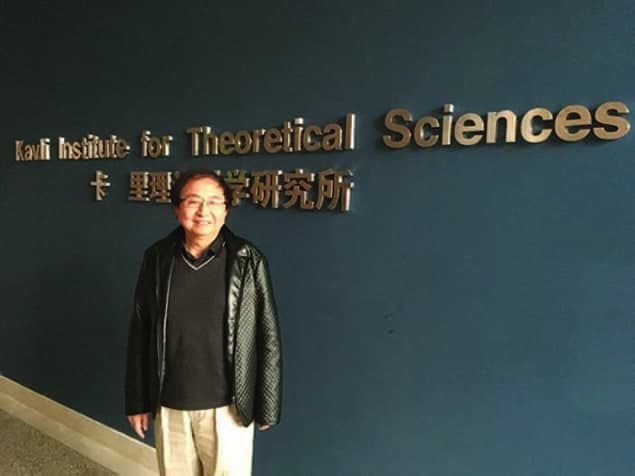Michael Banks talks to theoretical condensed-matter physicist Fuchun Zhang, director of the new Kavli Institute of Theoretical Sciences in Beijing, about the challenges of attracting top-class talent to China

What is the origin of the Kavli Institute of Theoretical Sciences (Kavli ITS)?
In 2006 the Kavli Foundation endowed the Kavli Institute for Theoretical Physics China (KITPC), which was located at the Institute of Theoretical Physics of the Chinese Academy of Sciences (CAS). Last year, the CAS and the Kavli Foundation repurposed the KITPC as Kavli ITS, which is located at the University of CAS (UCAS). The change of the name reflects the broader fields that Kavli ITS will cover, and also avoid the name overlapping with the Kavli Institute for Theoretical Physics at the University of California, Santa Barbara
How will Kavli ITS differ from KITPC?
Kavli ITS has a new vision to establish its own high-quality research team. It will cover all sciences and not just physics. In the first stage we plan to focus on four areas: condensed-matter physics; particle physics; biophysics and quantitative biology; and quantum information and computing. The institute will cover other fields such as quantum chemistry and earth science at a later date.
What attracted you to Kavli ITS?
I carried out a PhD at Virginia Tech in the US in 1983 and spent the next two decades in the US and Europe before moving to the University of Hong Kong in 2003. At that time Hong Kong was considered a window between China and the West and I helped organize visitor programmes and annual workshops in the city that brought top Western and Chinese physicists together. That kind of activity benefited people very much and it is something I want to continue at Kavli ITS. Taking up the post was a good opportunity and challenge for me to do that.
What is the current status of the institute?
I started as director in January and the new institute started from zero. We are now actively recruiting new faculty members. Kavli ITS is temporarily located at UCAS’s Zhong-Guan-Cun campus in Beijing and the institute’s offices have just been finished. Space will gradually increase as we grow as an institute. The institute is planning its permanent building at UCAS’s Huai-Rou campus, which is in a suburb of Beijing. We hope to move there within the next three years.
How is Kavli ITS funded?
Where our faculty have joint appointments with UCAS, their salaries will be paid for by the university. In the first few years, our budget from UCAS will be around ¥6m each year (£670,000). On top of that we also have the endowment from the Kavli Foundation. The Kavli Foundation does not just give us funding – it also provides support.
How many people will work at the institute?
We are aiming for around 30 faculty, whom we will recruit over the next five to 10 years. The institute must be international, so there is a strong desire to hire both Chinese nationals as well as non-Chinese. I will try to have around a third foreigners and the rest Chinese.
How will you attract foreign researchers?
We aim to provide competitive salaries for those researchers from outside China. Indeed, it is a challenge to get foreigners to stay in China for long periods, mostly because of the different culture. Language is also a problem since English is not widely used in China except at the institute or university. We are also competing with other first class institutes in China and the world. For those researchers who do not want to move to China, we have a programme so they can visit for a limited time. Kavli ITS can become a second home to those researchers.
How will you also compete for domestic talent with neighbouring universities such as Peking and Tsinghua?
There is strong competition for us. One benefit is that we offer a salary comparable to that in the US or Europe. Another benefit is the brand name of the Kavli institute. I also hope that I have a good reputation for attracting young people here.
How do you think the Kavli Foundation can help Chinese researchers?
There are 20 Kavli institutes in the world that are all conducting first-class research. The Kavli Foundation can help Kavli ITS to be connected with the other Kavli institutes, and set a fine standard for researchers in China. I hope it can play a positive role as a bridge between China and the West. In the theoretical sciences, we like to exchange ideas, so it is important that we have the methods to exchange ideas with those from outside China and that is why I would like to have high-quality visitor programme.
How has physics in China changes in recent years?
In the past decade, science, and physics in particular, have developed rapidly. When I was in Hong Kong in the early 2000s, it was ahead of China in physics, but now if you compare facilities, in many aspects China is ahead. China is also much more modernized, being close to Western standards.
How would you compare China with the US now?
In terms of speed of advancement, China is ahead. There are a few topics, such as topological insulators and superconductivity, where China is on a par with the US, but overall China is still behind by a distance. Yet it is getting closer each year.
What is your focus for the coming year and beyond?
We need to recruit more physicists, including those from outside China. We are currently designing and building a dedicated building for the institute at UCAS’s new campus, which will be ready in 2020. The campus will also include apartment blocks and schools for employees’ children.



